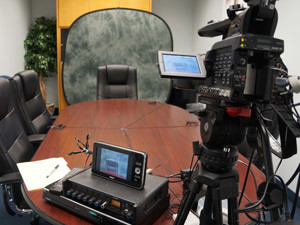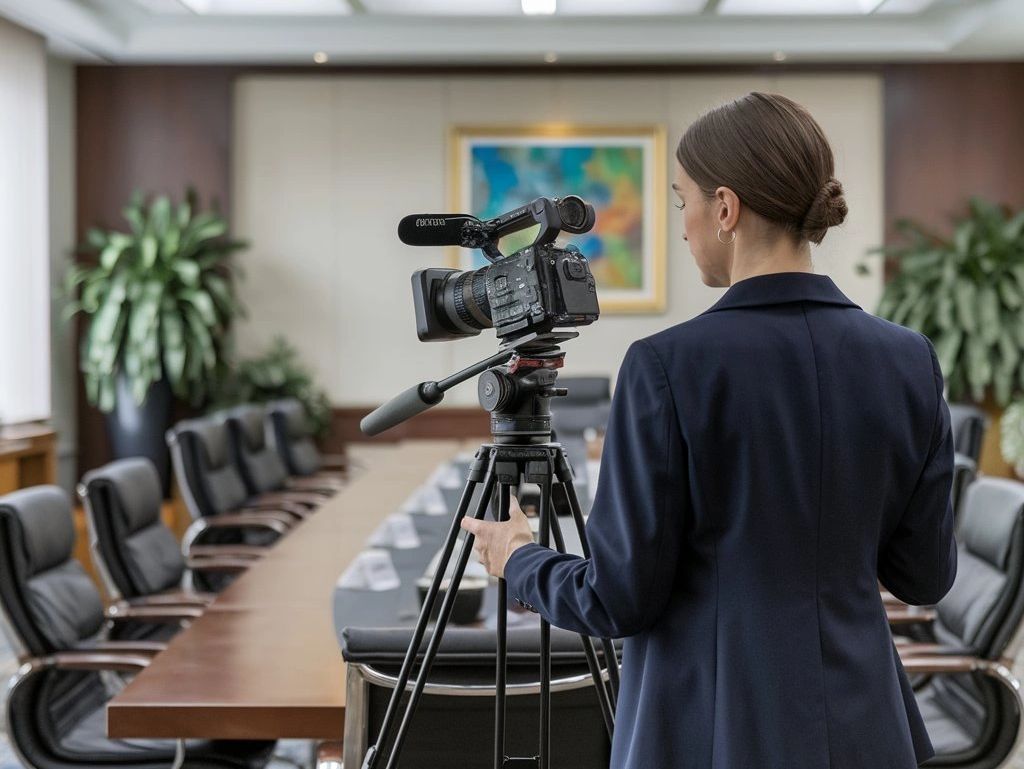Legal video depositions explained: From scheduling to secure storage
The Significance of Legal Video Clip Depositions in Modern Legal Solutions: What You Ought to Know
Legal video clip depositions have come to be essential in today's lawful landscape. They give a multidimensional sight of witness statements that conventional records simply can not match. By catching both non-verbal and verbal interaction, these depositions enhance the total understanding of a witness's integrity. Nevertheless, the performance of video depositions depends upon various aspects, including conformity with legal criteria and finest practices (legal video depositions). Checking out these elements reveals their true significance in contemporary legal services
What Are Legal Video Depositions?
Lawful video depositions function as an essential device in the lawsuits process. They involve taping witness testaments in a video style, recording both verbal and non-verbal interaction. This approach enables lawyers to record the disposition, expressions, and responses of witnesses, providing a richer context for the testament. Generally carried out in a regulated environment, these depositions are led by lawyers who ask concerns while a stenotype reporter records the dialogue. The resulting video can be crucial for trial preparation, as it enables attorneys to examine the reputation of witnesses and improve their strategies. Additionally, lawful video depositions can be used in different legal contexts, ranging from civil disputes to criminal cases. The acoustic and aesthetic components of video clip depositions boost the discussion of proof, making it a crucial part in the modern-day legal landscape. In general, they contribute considerably to the efficiency and performance of lawful procedures.

Benefits of Video Clip Depositions Over Standard Techniques
Video depositions provide various advantages contrasted to traditional methods of taking witness statements. One significant benefit is the capacity to record both visual and audio components, giving a much more extensive record of the witness's statements. This twin style improves clarity and permits attorneys to reference particular subtleties throughout trial prep work. Furthermore, video depositions promote remote engagement, making it simpler for witnesses who might be not available for in-person looks because of geographical constraints or wellness issues.Moreover, video clip depositions can expedite the total deposition process, reducing the moment and costs related to travel and logistics. They additionally improve accessibility, as taped depositions can be easily shared amongst legal groups and referenced at any moment. This ease adds to better situation management and preparation. On the whole, video depositions stand for a contemporary, effective approach to collecting witness testaments, straightening with the progressing needs of the legal career.
The Function of Body Movement and Tone in Testimonies

In legal video depositions, body movement and tone play vital functions in communicating a witness's credibility and credibility. Nonverbal hints can give insights into a witness's emotional state, affecting just how their testament is perceived. Recognizing the influence of these components is important for jurors and attorneys alike when assessing the dependability of a testament.
Nonverbal Communication Insights
While spoken interaction is commonly stressed in lawful testaments, nonverbal cues such as body language and tone play an important role in conveying trustworthiness and emotion. Onlookers of depositions may note that a witness's position, gestures, and faces can greatly influence assumptions of integrity. Constant eye contact might signify self-confidence, while avoiding stare could suggest dishonesty or discomfort. The tone of voice-- its pitch, quantity, and rate-- can impart sensations of genuineness or uncertainty. Legal specialists must be in harmony with these nonverbal signals, as they typically provide essential context that complements spoken words. Recognizing these nuances can boost the efficiency of depositions and influence the result of legal process.
Emotional Tone Influence
The emotional tone shared throughout legal testaments considerably affects just how a witness is viewed. Body movement, vocal inflections, and face expressions play essential functions fit the story of a statement. A witness showing self-confidence through consistent eye contact and a calm tone can infuse a sense of dependability and engagement. On the other hand, indicators of stress and anxiety, such as fidgeting or a shaky voice, might result in apprehension regarding their account. The nuances of psychological expression can influence the interpretation of realities, making it essential for attorneys to recognize these cues. In video depositions, the aesthetic and auditory parts combine, highlighting the value of psychological tone in conveying sincerity and reliability within the lawful procedure.
Trustworthiness and Trustworthiness
An important consider developing reputation and trustworthiness during statements lies in the witness's body language and intonation. Viewers frequently count on non-verbal hints-- such as eye get in touch with, pose, and motions-- to analyze a witness's genuineness. A witness who maintains eye call and presents open body language might be viewed as even more truthful and reputable than one who avoids eye contact or shows up shut off. Furthermore, tone of voice plays an essential duty; a constant, tranquil tone can strengthen the integrity of the testimony, while variations in pitch or quantity may raise uncertainties. Eventually, the combination of body language and vocal tone greatly influences exactly how a witness's declarations are gotten and translated in a lawful context.
Finest Practices for Conducting Video Clip Depositions
Conducting video clip depositions calls for mindful preparation and execution to guarantee a efficient and clear discussion of statement. First, it is essential to choose a silent, well-lit place to minimize disturbances and protected optimum video quality. The tools must be evaluated ahead of time, consisting of video cameras, microphones, and lights, to prevent technical concerns during the deposition.Next, celebrations entailed need to evaluate the format and treatments in advance, making certain that every person understands their functions. The deponent needs to be briefed on the procedure, consisting of exactly how to respond clearly and concisely.Additionally, keeping a professional behavior throughout the session is crucial. This includes avoiding from talking over each other and verifying that all inquiries are guided suitably. It is crucial to record the deposition in a layout that allows for very easy playback and review, protecting the stability of the statement for future usage.
Legal Factors To Consider and Compliance Issues
Exactly how do lawful factors to consider and conformity issues affect the performance of video depositions? Lawful professionals should navigate a complex landscape of regulations, ensuring that video depositions follow jurisdictional regulations and standards. Compliance with laws concerning personal privacy, authorization, and videotaping approaches is crucial. For circumstances, getting specific permission from all parties involved is necessary to stay clear of lawful repercussions.Additionally, the admissibility of video evidence in court can rest on compliance with procedural requirements. Guaranteeing that the tools made use of satisfies technological requirements is also vital, as inadequate high quality can weaken the deposition's reliability.Moreover, attorneys need to be aware of any particular Your Domain Name state laws that regulate video clip depositions, as these can vary greatly. Failing to deal with these factors to consider can not only endanger the stability of the deposition however additionally affect the total case strategy, eventually affecting the customer's legal results.
Exactly How Video Depositions Influence Jury Understanding
While video clip depositions can work as effective tools in lawful proceedings, their impact on court understanding is significant. The auditory and visual components of video recordings supply jurors with an extra extensive understanding of witness attitude, trustworthiness, and emotional feedbacks. This multimedia approach can improve the jurors' capability to examine the dependability of testimony contrasted to standard text-based transcripts.Moreover, video depositions enable jurors to observe body movement, intonation, and faces, every one of which can influence their interpretation of the witness's declarations. The presence a knockout post of a witness on display can humanize them, cultivating empathy and link, which might persuade jurors' viewpoints. On the other hand, a witness who shows up unreliable or incredibly elusive on video clip might bring about negative perceptions that influence a jury's decision. Ultimately, the dynamic nature of video depositions plays a crucial function fit just how jurors analyze proof and reach their judgments.
The Future of Video Clip Depositions in Legal Method
As innovations in technology remain to reshape the legal landscape, the future of video depositions is poised for substantial advancement. Innovations such as expert system, digital fact, and boosted video clip conferencing tools are anticipated to streamline the deposition process and improve accessibility. Legal specialists might use AI-driven analytics to examine witness reliability and situation stamina much more effectively.Moreover, the combination of online reality could permit courts to experience immersive simulations of depositions, offering deeper context and understanding. Additionally, the trend towards remote depositions is likely to continue, supplying greater flexibility for lawyers and clients alike.As remote job ends up being significantly stabilized, video clip depositions will likely end up being basic practice, reducing costs and time restraints connected with traditional methods. Generally, these technological improvements assure to improve the performance, effectiveness, and availability of video clip depositions in legal practice, eventually changing just how legal specialists get ready for test.
Regularly Asked Inquiries
Just How Much Do Lawful Video Depositions Generally Cost?

Can Video Depositions Be Utilized in Any Type of Case?
Video clip depositions can be utilized in numerous sorts of cases, including civil, criminal, and family members law. Their versatility permits attorneys to present witness statements properly, adapting to the specific requirements of different legal circumstances.
What Equipment Is Required for a Video Deposition?
To perform a video clip deposition, informative post important devices consists of a high-quality video camera, microphone, illumination, and a trusted recording gadget. In addition, a computer with editing software application may be needed for post-production and formatting the last video clip.
Just how Lengthy Does a Typical Video Clip Deposition Last?
A common video clip deposition lasts in between 2 to four hours, depending on the complexity of the case and the number of questions posed. Extended sessions may occur, but breaks are usually incorporated for participant comfort.

Are Video Clip Depositions Admissible in Court?
Video clip depositions are normally permissible in court, given they abide by lawful requirements and rules of evidence. Their usage boosts clearness and protects witness statement, helping in the judicial process throughout tests and hearings. Legal video depositions have come to be crucial in today's legal landscape. Additionally, lawful video clip depositions can be made use of in different lawful contexts, ranging from civil conflicts to criminal situations. In addition, video clip depositions assist in remote involvement, making it easier for witnesses that might be not available for in-person appearances due to geographical restraints or health and wellness issues.Moreover, video depositions can quicken the overall deposition procedure, lowering the time and expenses associated with traveling and logistics. Making sure that the devices used satisfies technical criteria is likewise important, as inadequate high quality can undermine the deposition's reliability.Moreover, lawyers should be mindful of any type of specific state regulations that govern video clip depositions, as these can vary substantially. Furthermore, the trend toward remote depositions is most likely to linger, providing higher adaptability for lawyers and customers alike.As remote work ends up being increasingly normalized, video clip depositions will likely end up being basic method, lowering costs and time restraints connected with traditional methods.